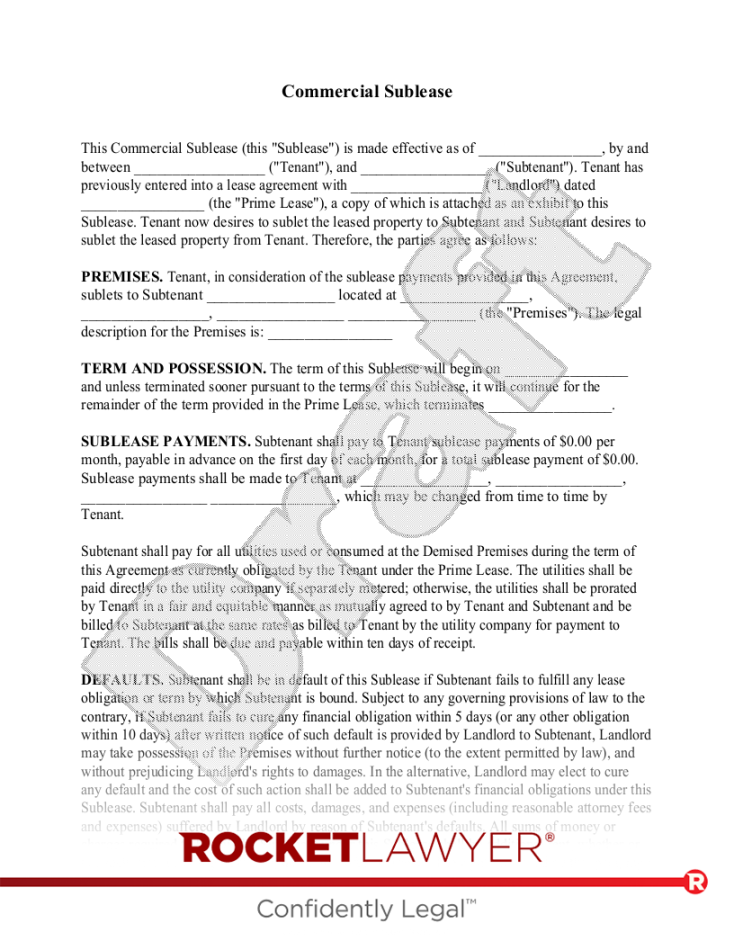A sublease commercial agreement template is a legal document that outlines the terms and conditions of a sublease arrangement between a tenant (the sublessor) and a subtenant. It’s a crucial tool for businesses that need to lease out a portion of their leased space to another party.
Key Elements of a Sublease Commercial Agreement
A well-crafted sublease commercial agreement should include the following essential elements:
Free Commercial Sublease Template & FAQs – Rocket Lawyer Image Source: rocketlawyer.com
1. Parties Involved
Sublessor: The original tenant who is subletting a portion of their leased space.
Subtenant: The party renting the space from the sublessor.
Lessor: The landlord who has leased the original space to the sublessor.
2. Description of the Premises
Free Commercial Sublease Agreement Templates [Word,PDF] Image Source: templatelab.com
Specific Location: The exact address of the subleased space.
Size and Dimensions: The square footage or other relevant measurements of the space.
Use Restrictions: Any limitations on how the subtenant can use the space.
3. Term of the Sublease
Start Date: The date the sublease begins.
End Date: The date the sublease ends.
Renewal Options: Any provisions for renewing the sublease.
4. Rent and Other Charges
Base Rent: The monthly or annual rent the subtenant will pay.
Additional Charges: Any additional fees, such as utilities, property taxes, or maintenance costs.
Payment Terms: The specific dates and methods of payment.
5. Subtenant’s Obligations
Compliance with Lease: The subtenant must adhere to all terms and conditions of the original lease agreement.
Maintenance and Repairs: The subtenant may be responsible for maintaining the subleased space.
Insurance: The subtenant may need to carry liability insurance.
Indemnification: The subtenant may be required to indemnify the sublessor for any liabilities or damages.
6. Sublessor’s Obligations
Quiet Enjoyment: The sublessor must ensure the subtenant’s quiet enjoyment of the premises.
Access to Common Areas: The subtenant may have access to shared common areas.
Notice and Consent: The sublessor may need to provide notice to the lessor and obtain consent for the sublease.
7. Default and Remedies
Events of Default: Actions by the subtenant that could trigger a default, such as non-payment of rent or breach of other terms.
Remedies: The remedies available to the sublessor in the event of default, such as acceleration of rent, eviction, or legal action.
8. Governing Law and Dispute Resolution
Governing Law: The jurisdiction whose laws will govern the sublease agreement.
Dispute Resolution: The method for resolving disputes, such as mediation or arbitration.
9. Entire Agreement
Merger Clause: This clause states that the written agreement represents the entire understanding between the parties.
Waiver Clause: This clause specifies that a waiver of any breach of the agreement does not constitute a waiver of future breaches.
10. Notices
Method of Notice: The preferred methods for delivering notices, such as email or certified mail.
Design Elements for a Professional Sublease Commercial Agreement Template
To create a professional and trustworthy sublease commercial agreement template, consider the following design elements:
Clear and Concise Language: Use plain language and avoid legal jargon.
Consistent Formatting: Use a consistent font, font size, and line spacing throughout the document.
Professional Layout: Use a clean and professional layout with ample white space.
Headings and Subheadings: Use headings and subheadings to organize the document and improve readability.
Bold and Italic Text: Use bold and italic text to emphasize important terms and conditions.
Bullet Points: Use bullet points to list key points and improve readability.
Page Numbers: Include page numbers for easy reference.
Signature Blocks: Provide clear signature blocks for all parties involved.
By incorporating these design elements, you can create a sublease commercial agreement template that is both professional and easy to understand.

![Free Commercial Sublease Agreement Templates [Word,PDF] Free Commercial Sublease Agreement Templates [Word,PDF]](https://theroyalmen.com/wp-content/uploads/2024/11/free-commercial-sublease-agreement-templates-word-pdf_0.jpg)